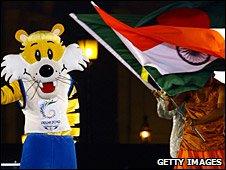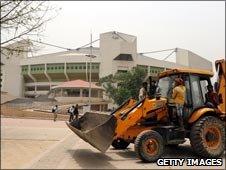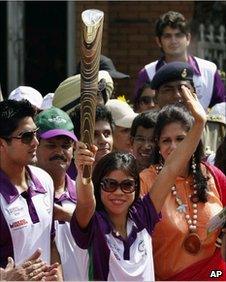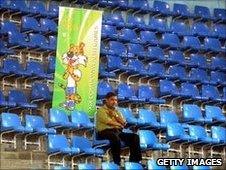Commonwealth Games may not pay for India
- Published

The Games are a chance for India to showcase its talents
The Commonwealth Games will be the biggest sporting event to take place in India.
For companies it will be a unique opportunity to reach out to consumers.
But how has the search for sponsorship been going and have the Games proved to be as attractive as promised?
Stretched out across a dull building in central Delhi are big purple and pink stickers with what look like vegetable printing designs by a child.
These are the first signs that came up to announce the biggest sporting event the country has ever hosted - the Delhi Commonwealth Games 2010.
It is an opportunity for the country to showcase its talents both in and out of the competition.
Building sites
Now with fewer than 100 days to go for the event - the entire city looks like one big construction site.

There has been intensive infrastructure work
Roads are being relaid, pavements have been dug up, flyovers are being built, and subways have been closed down.
Even the Delhi airport has got a swanky new terminal.
It is the most expensive branding exercise the country has ever indulged in.
But even as the country begins the countdown to the Games, the organisers are still looking around for sponsors to fund this mega event.
The Commonwealth Games will cost taxpayers more than $2.5bn, making it the most expensive Games ever.
In comparison, the Melbourne Games in 2006 cost $1.1bn.
With a price tag this high, the Delhi government has already given tax exemptions to the organisers.
'Very encouraging'
But to raise the money needed to fund the Games, the government is also raising taxes.
Delhi's residents will have to pay more for domestic cooking gas, diesel, high-end mobile phones and even alcohol.
The secretary-general of the Games' organising committee, Lalit Bhanot, is still optimistic.

The Games have to compete with other attractions such as IPL cricket
"We are getting sponsors who are offering sponsorship in cash and kind, and most of them will come over the next few months," he says.
"The inflow is very encouraging. We are hopeful of getting a lot of money. We hope to cover the deficit.
"We have promised the people of the country revenue-neutral Games and we will deliver it."
Ticket prices
The two main sponsors are a public sector bank, Central Bank of India, and the country's largest two-wheeler motorcycle company Hero Honda.
The organisers have tied up with the two main sponsors to sell tickets to the games through their retail outlets.
Tickets prices range from just over $1 to $1,100 (Rs50 to Rs50,000).
Four of the events, the marathon, the walk, cycling road race and the cycling time trial, are free.
Officials hope to sell 1.7 million tickets but almost 40% of the tickets for the sporting events have been kept at $5 and below.
But most analysts say merchandising and tickets sales are unlikely to generate a huge amount of money.
Central Bank of India is creating the entire banking infrastructure to meet the requirements of the organising committee, visiting players, officials and tourists.
B N S Ratnakar, the general manager of the bank says that they will be present in all the Games venues with best possible branding.
There will be money points, bank officers with mobile money disbursing units and foreign exchange points around the city.
"The bank will get a lot of mileage from the event. But more importantly, the banking services will be available to all the international athletes, officials and visitors."
But the Games are struggling to match the popular cricket tournament, the Indian Premier League, which has become the world's wealthiest cricket series. IPL's brand value is pegged at over $4bn.
Hero Honda has long been associated with cricket in India.
Now it has been signed on as the lead sponsor for the Commonwealth Games. But can the Games give it the kind of publicity that the IPL delivers?
'Eyeballs'
Anil Dua is the senior vice-president at Hero Honda.
He says there are two ways to look at your investments - short-term benefits and long-term pay-offs.
"We do believe that cricket gives you immediate - here and now kind of benefits because you get high television ratings and eyeballs and brand recall.
"But what happens when you associate with something like the Commonwealth Games is that you carve out a special niche in the minds of the audience."
TV viewing issues
But why are companies staying away from the Games?
The answer lies in the lack of clarity about what the Games will actually deliver, says one of the top sports branding agent - Latika Khaneja who runs Collage Sports Management.

There are fewer than 100 days until the Games begin
She says companies have incomes which they can either spread out over an entire year or spend on a 12-13 day event.
"There is no proven record of television ratings in India - there is no idea how much the actual viewership of the event is going to be," she says.
"To pick up that kind of a huge budget and dump it on a 13-day event is something that every company will think about."
Work is still on to build the stadiums and infrastructure in time for the Games in October.
Putting its best foot forward, the country hopes the games will showcase its image as a rising economic power.
But with sponsors reluctant to join the party, India will find it very tough to live up to the hype.